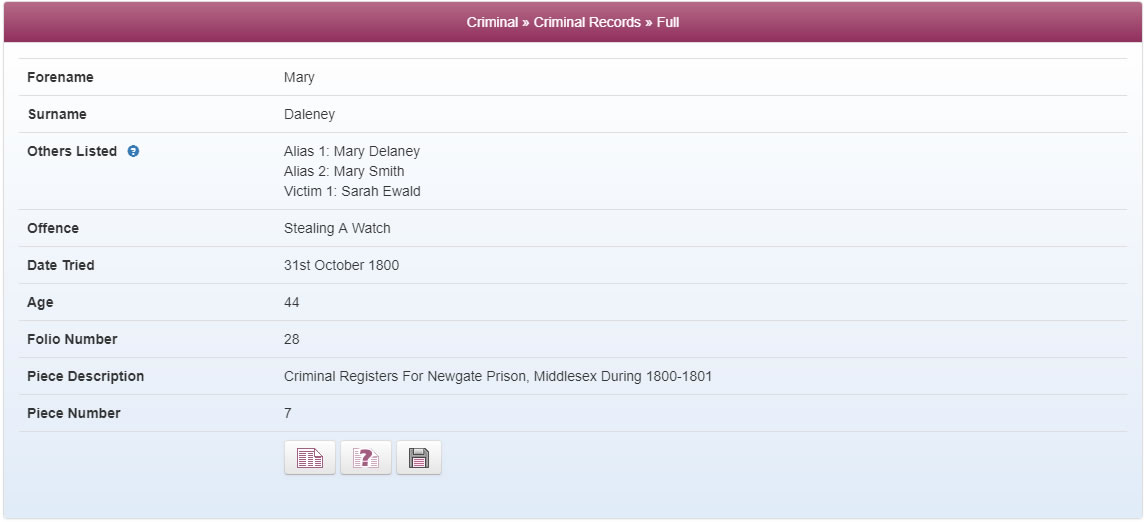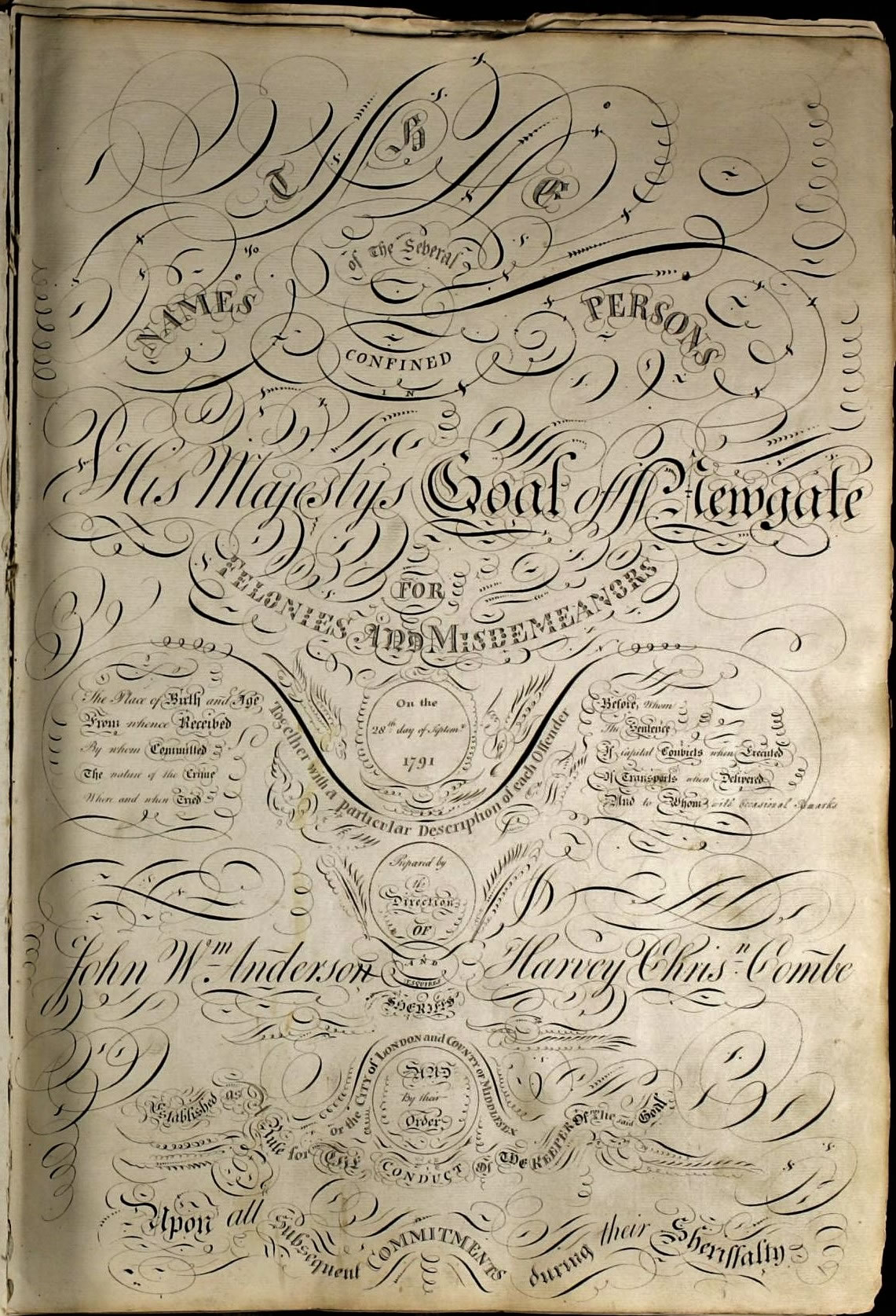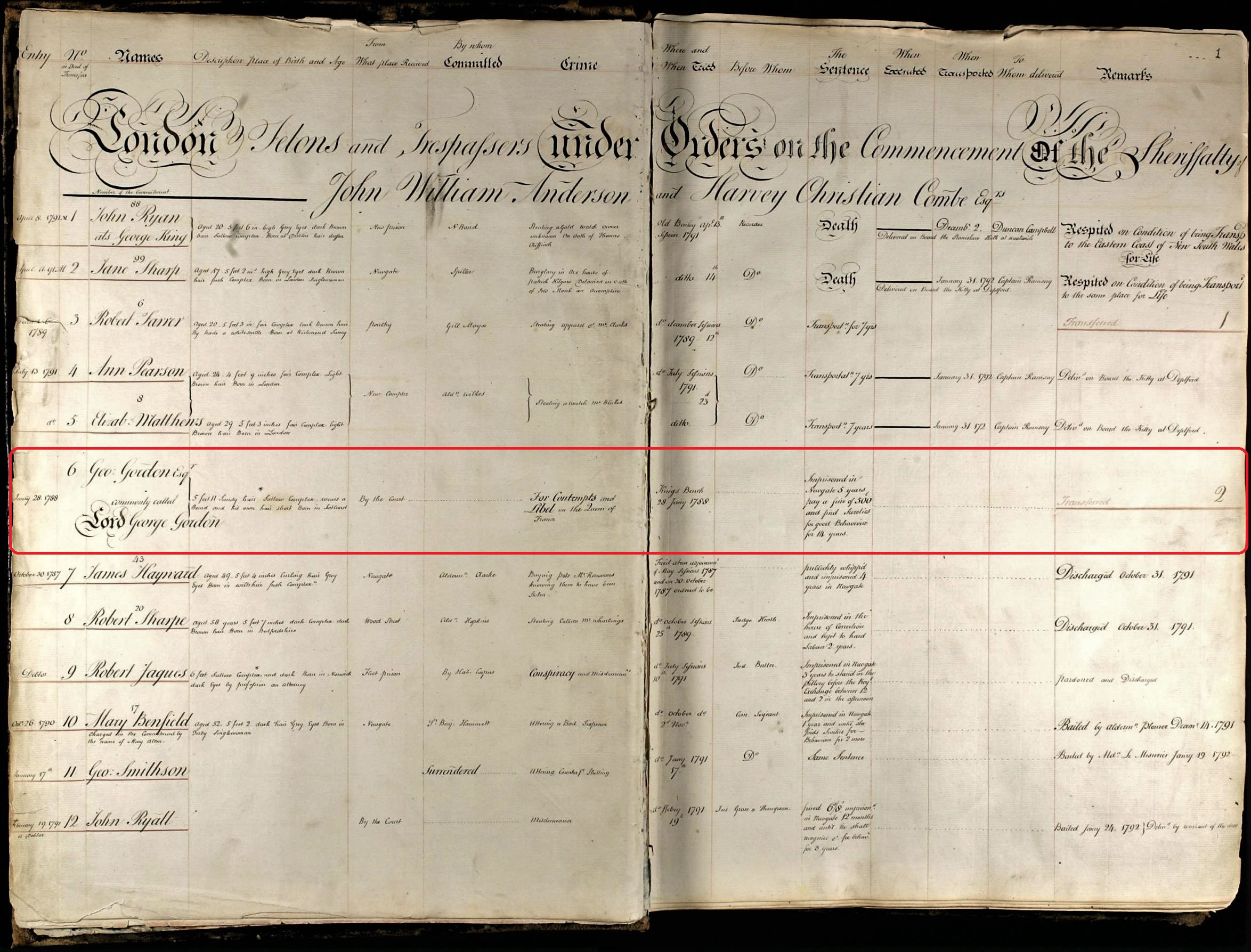Looking for criminals recorded in the HO 26 Newgate Prison Registers on TheGenealogist throws up some captivating examples. Immediately you become aware of just how harsh the sentences were in those days in comparison to today. All levels of society were locked up in Newgate Prison and it housed every type of criminal. Some of the inmates were locked up there having committed acts of petty crime, theft, burglary, or even highway robberies. There were others jailed at Newgate who had performed much more serious crimes such as rapes and murders. Situated, as it was, next to the Old Bailey, it also took prisoners from the court who were awaiting their onward transfer to other jails, or to hulk ships and eventual transportation beyond the seas.
Doing a search for a Mary Daleney, a 44 year old widow who was originally from Dublin, throws up her appearance in the list for the October Sessions in 1800. Using TheGenealogist’s interface reveals to us the offence that she was there for: Stealing a watch.

Clicking the link that takes us to the image of the page of the register allows us to see a description of Mary. If this was your ancestor you would discover that she was 5 foot 7 inches tall and was of a dark complexion, with brown hair and hazel eyes. We are able to see from the image that Daleney had stolen the watch from her mistress Sarah Ewald.

The image shows us that entries can span two pages of the register. Looking at the right hand sheet we may be shocked to see that her sentence for the crime was death! The next column, however, reveals that mercy was shown her and she was pardoned on 5th December 1800. But this did not mean that she was free instead she was imprisoned for 12 months in a House of Correction, a prison such as Bridewell. This was quite some difference in the severity of her punishment and which we may assume she was very grateful for.

For Contempt and Libel on the Queen of France
Researching further back to the late 18th century in these records finds a register with an amazing title page. The book is a list of the prisoners being transferred to the custody of the new sheriffs, who were taking up their post at this time. It is artistically presented as “The names of several persons confined in His Majesty’s Goal of Newgate for Felonies and Misdemeanors on the 28th day of September 1791”.

Just one page in and we are presented with George Gordon Esq, who we learn is commonly known as Lord George Gordon. His imprisonment at Newgate was for a most unusual offence: “For Contempt and Libel on the Queen of France”.

Gordon was a controversial and fascinating character; a younger son of the 3rd Duke of Gordon he is best remembered in British history for the Gordon Riots of 1780. This was when several days of rioting took place based on an anti-Catholic feeling among some people over the Papists Act of 1778; legislation that was intended to reduce official discrimination against British Catholics. But Lord George Gordon, at the time head of the Protestant Association and an M.P., warned that the law would mean that Catholic soldiers in the British Army would then become a dangerous threat. The protest that has been given his name, evolved into rioting as well as widespread looting and because the local magistrates were in fear of the rampaging crowds the situation got out of hand. It was finally put down when the Army moved in and began firing at the demonstrators.
Access Over a Billion Records
Try a four-month Diamond subscription and we’ll apply a lifetime discount making it just £44.95 (standard price £64.95). You’ll gain access to all of our exclusive record collections and unique search tools (Along with Censuses, BMDs, Wills and more), providing you with the best resources online to discover your family history story.
We’ll also give you a free 12-month subscription to Discover Your Ancestors online magazine (worth £24.99), so you can read more great Family History research articles like this!
Lord Gordon, being blamed for instigating the riots, was then charged with high treason and imprisoned in the Tower of London. This was in 1780 and his stay in the Tower was not an uncomfortable one as he was allowed visitors such as his friends and the Rev John Wesley, the Methodist leader. In the end Lord Gordon was acquitted of this crime on the grounds that he had no treasonable intent and was released.
After such an experience many people would have been less willing to continue being controversial, but that would not be the case for Lord Gordon. In 1786 the Archbishop of Canterbury excommunicated him for his refusal to give evidence in an ecclesiastic court case. Gordon is reputed to have retorted that to be expelled from a society to which he had never belonged to was an absurdity worthy of an Archbishop. As a Scotsman, the Church of England was not his strand of Protestantism. In the same year as he was excommunicated, and at the age of 36, he then turned his back on Christianity completely when he converted to Judaism. The very next year, 1787, Lord Gordon was embroiled in the case that would eventually lead to him being in Newgate. He was convicted of libeling none other than Marie Antoinette, the Queen of France. Also charged with contempt of the administration of justice in England, he was found guilty of the crimes and so was in serious trouble again. Being allowed bail, however, he escaped justice by fleeing to the Netherlands. France made diplomatic representations to the Dutch and Lord Gordon was forced by them to leave their territory. On his return to England he was taken into custody and in January 1788 he was handed down his sentence of five years’ imprisonment in Newgate and a fine of £500.

As we can see by zooming in on the register, found on TheGenealogist, there is also mention of sureties for good behaviour for 14 years. In actual fact these were very harsh additional conditions that would mean Gordon could never leave Newgate alive. In total the guaranties were reported to be for the huge sum of £15,000. While serving his sentence and at aged 46, Lord George Gordon caught typhoid fever in the prison and became seriously ill. A further record for the prisoner amongst the HO 26 Newgate Prisoner Registers, dated 28th day of September 1793, has one word in the remarks column: Dead. This fascinating inmate of Newgate was released from prison but only in his coffin.
Criminal records on TheGenealogist are a fascinating collection that can allow you to find miscreant ancestors who were recorded by those administering justice in the years past.






